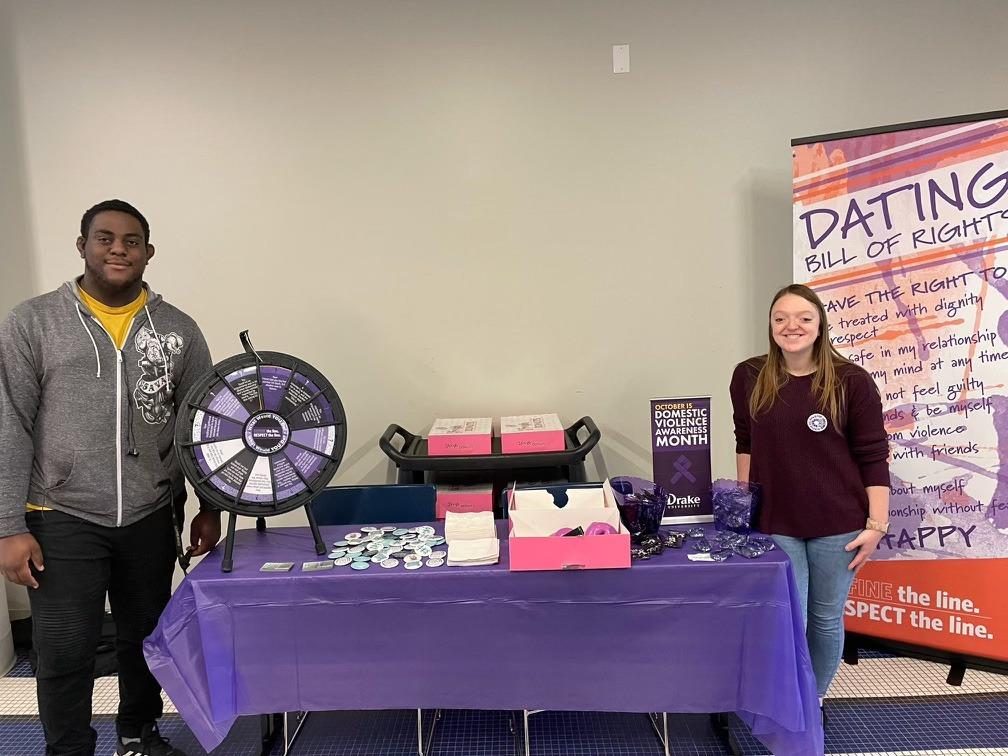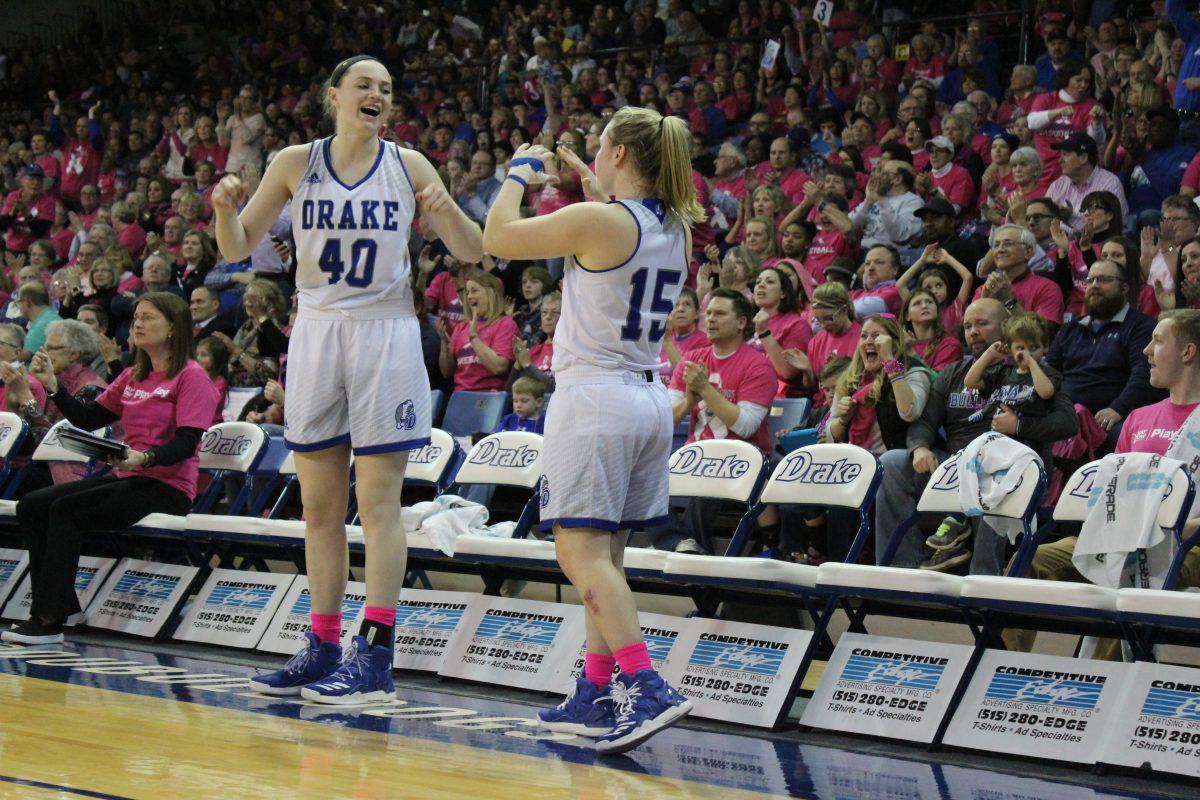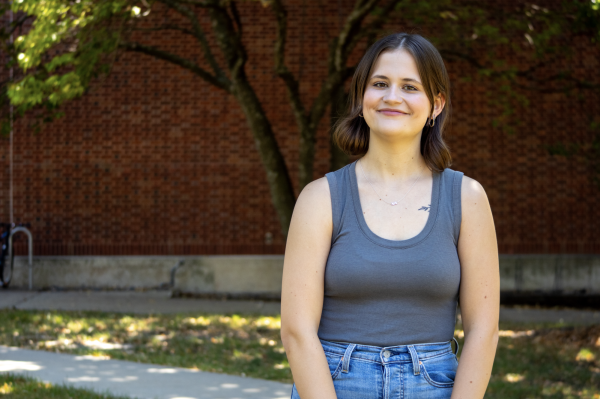When Director of Prevention Programming Lynne Cornelius came to Drake six years ago, there were only eight to 12 student Violence Intervention Partners in the program. Since then, prevention programming at Drake has grown and transformed, with the current number of VIPs at just more than 40.
“In the past year, VIP has just grown in its membership by so many people,” VIP Addie Cunningham said. “Lynne used to talk about how it would be like – people would have to take multiple shifts a month on the phone. And now, it’s almost every five weeks because we have so many members that we’re able to take the phone and take shifts.”
Drake has a wide spectrum of prevention programming available for students. The two major programs that Cornelius leads are VIP – a program that trains students to be state-certified anonymous victim advocates – and Positive Mentality – a space on campus for men to have genuine conversations. Cornelius also works closely with athletics and Fraternity and Sorority Life to implement prevention programming.
“I think [being a VIP has] made me a better communicator and a better leader, especially since you do have to be pretty clear and concise when talking about sexual assault,” Cunningham, who is VIP’s Administrative Team lead, said. “I think it’s really helped me grow in being able to present myself and present VIP to a large-scale community.”
A previously popular program, Prevention Ambassadors, ended during the COVID-19 pandemic. Cornelius is in the process of rebuilding a similar program and is hoping to develop an option for students who want to be involved that is less of a time commitment than VIP.
“The tough part was, [the Prevention Ambassadors] would get trained up, and they would go to Welcome Week, and then there was really no other place for them to connect,” Cornelius said. “It’s really hard to train students up in prevention and then just have them not have anything to do with it.”
Beyond the Prevention Ambassadors programming, prevention programming at Drake is in a stage of revisioning, according to Cornelius. Given the new Faculty Senate budget recommendations at Drake, Cornelius will no longer be able to teach a prevention-based First Year Seminar. She has taught this course for the last three years and sees it as a foundational aspect of the growth of the programs.
“Not having access to that because of decisions made, I get to re-envision, again co-curricularly, ‘What does prevention look like?’” Cornelius said. “I’m excited to do that. It’s a little sad because it’s like – ugh, I had this really great space. I think students’ eagerness and students’ values on prevention, those still show up outside of the classroom.”
Throughout the year, prevention programming at Drake has put on a wide variety of programs varying in commitment, tone and content. For example, during October, which is Domestic Violence Awareness Month, VIP did a golf cart event promoting healthy romantic and platonic relationships.
“Awareness activities don’t have to be dark and heavy,” Cornelius said. “We can also do them in fun and positive ways. Sometimes we give rides to class, sometimes we’re just handing out swag, those kinds of things. It’s just been a fun way to bring awareness to the group.”
VIP has led other events throughout the year, including events during Welcome Weekend, the Red Flags passive event, healthy relationship education near Valentine’s Day and, most recently, Sexual Assault Awareness month in April. Cunningham has seen an increase of awareness surrounding these events and VIP in general.
“It’s always fun when you’re tabling and you ask someone, ‘Oh do you know what VIP is?’ and they’re like, ‘Yeah, actually, I do, I’ve seen your programming around campus already,’” Cunningham said.
The Bulldogs Against Sexual Assault event, which happens in April, looks different every year, Cornelius said. This year, it consisted of a series of major-specific speakers. For example, the College of Pharmacy and Health Sciences had a presentation from a sexual assault nurse practitioner and the School of Education had a presentation about how to handle student disclosure and recognize abuse. This lecture series was primarily student-led, and Cunningham worked primarily with two other VIPs to coordinate the events.
“We did a lot of collaborations with professional fraternities or groups within the schools,” Cunningham said. “The surveys have been good and positive so far, and I think people are learning a lot — just because sexual assault is a topic not many people want to talk about because it does make us uncomfortable. I think learning about how to improve your career just by being knowledgeable on the topic has been really good.”
This year, VIP also introduced a Spanish option for texting and calling their hotline. Several student VIPs were already fluent in Spanish and were open to offering the option.
“I wouldn’t say it was a need that was addressed, but I think it’s definitely going to impact our community in a really positive way, to offer that,” Cornelius said.
Next year, Cornelius has a variety of goals, including connecting more with upperclassmen and building mutual relationships with student organizations.
“Our plan for next fall is to highlight the upperclass halls in that first month,” Cornelius said. “First-years get it through Welcome Week, but then we haven’t really reconnected with our upperclass students.”
Ultimately, Cornelius emphasizes that prevention programming at Drake is a resource for everyone, not just those who have experienced extreme trauma. She plans to continue to emphasize this accessibility moving forward.
“Some of the stigma around VIP is that you can only call if you’ve been sexually assaulted, or you can only call if you’ve experienced dating violence,” Cornelius said. “We really want to let people know that VIP is for all experiences. It can be as simple as, ‘I had a really bad date and I don’t know how to talk about it.’ Or ‘I have a friend in need.’”



